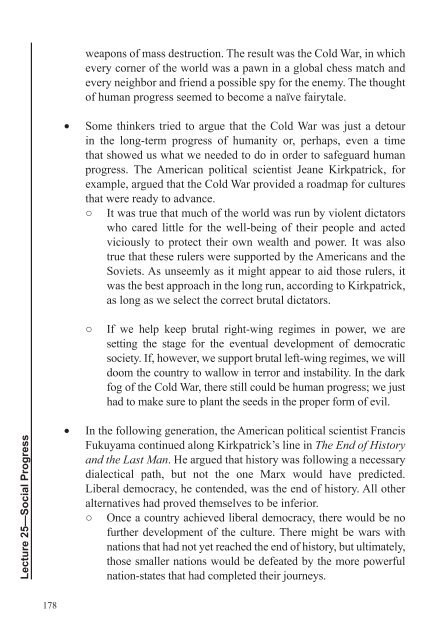Redefining Reality - The Intellectual Implications of Modern Science
You also want an ePaper? Increase the reach of your titles
YUMPU automatically turns print PDFs into web optimized ePapers that Google loves.
weapons <strong>of</strong> mass destruction. <strong>The</strong> result was the Cold War, in which<br />
every corner <strong>of</strong> the world was a pawn in a global chess match and<br />
every neighbor and friend a possible spy for the enemy. <strong>The</strong> thought<br />
<strong>of</strong> human progress seemed to become a naïve fairytale.<br />
<br />
Some thinkers tried to argue that the Cold War was just a detour<br />
in the long-term progress <strong>of</strong> humanity or, perhaps, even a time<br />
that showed us what we needed to do in order to safeguard human<br />
progress. <strong>The</strong> American political scientist Jeane Kirkpatrick, for<br />
example, argued that the Cold War provided a roadmap for cultures<br />
that were ready to advance.<br />
It was true that much <strong>of</strong> the world was run by violent dictators<br />
who cared little for the well-being <strong>of</strong> their people and acted<br />
viciously to protect their own wealth and power. It was also<br />
true that these rulers were supported by the Americans and the<br />
Soviets. As unseemly as it might appear to aid those rulers, it<br />
was the best approach in the long run, according to Kirkpatrick,<br />
as long as we select the correct brutal dictators.<br />
<br />
If we help keep brutal right-wing regimes in power, we are<br />
setting the stage for the eventual development <strong>of</strong> democratic<br />
society. If, however, we support brutal left-wing regimes, we will<br />
doom the country to wallow in terror and instability. In the dark<br />
fog <strong>of</strong> the Cold War, there still could be human progress; we just<br />
had to make sure to plant the seeds in the proper form <strong>of</strong> evil.<br />
<br />
<br />
In the following generation, the American political scientist Francis<br />
Fukuyama continued along Kirkpatrick’s line in <strong>The</strong> End <strong>of</strong> History<br />
and the Last Man. He argued that history was following a necessary<br />
dialectical path, but not the one Marx would have predicted.<br />
Liberal democracy, he contended, was the end <strong>of</strong> history. All other<br />
alternatives had proved themselves to be inferior.<br />
Once a country achieved liberal democracy, there would be no<br />
further development <strong>of</strong> the culture. <strong>The</strong>re might be wars with<br />
nations that had not yet reached the end <strong>of</strong> history, but ultimately,<br />
those smaller nations would be defeated by the more powerful<br />
nation-states that had completed their journeys.<br />
178



